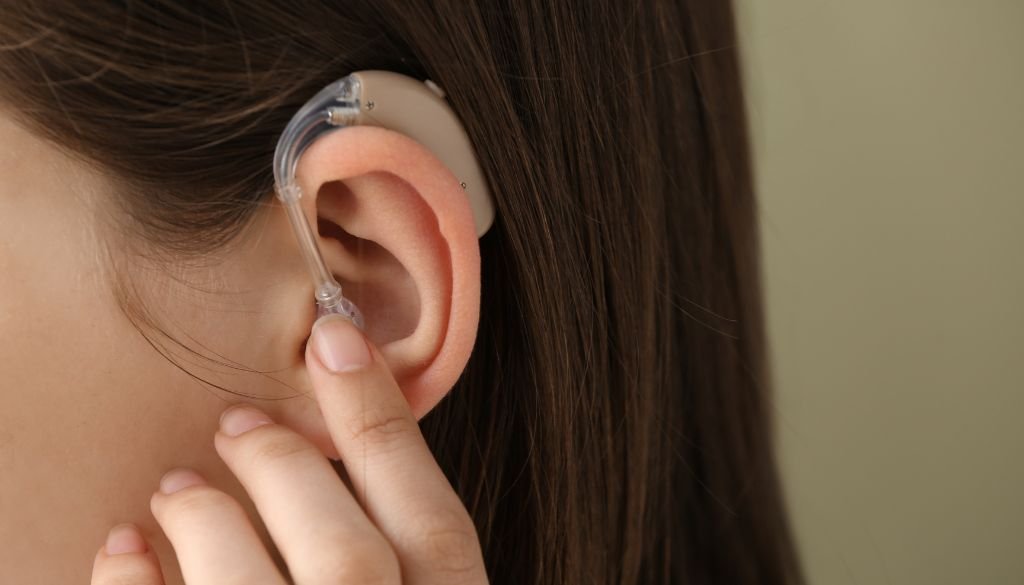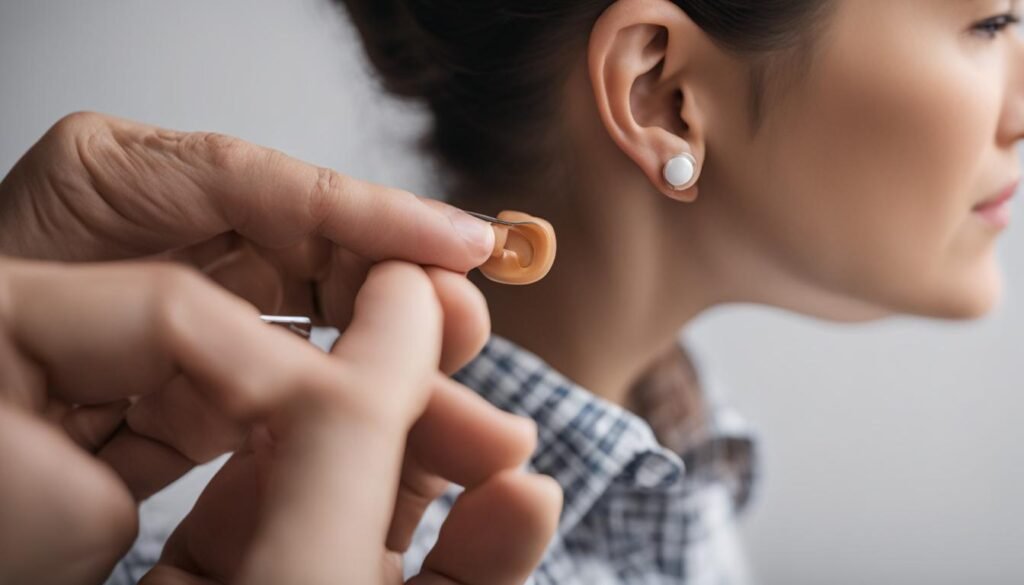Why Do My Hearing Aids Whistle? This is a frequent and annoying problem faced by many users. Whistling or unnecessary feedback in hearing aids has several potential causes, such as ill-fitting earpieces, blocked sound tubes, incorrect settings, a clogged or dirty ear canal, daily interference, or a malfunctioning device. Connect Hearing recommends several steps, including checking the earpiece fit, cleaning the sound tube, adjusting settings with professional help, ensuring ear canal cleanliness, minimizing interference from accessories like scarves and hats, and addressing any issues with the hearing aid itself.

Key Takeaways:
- Ill-fitting earpieces and blocked sound tubes can cause whistling in hearing aids.
- Improper settings and a blocked/dirty ear canal can also lead to whistling.
- Avoiding day-to-day interference and addressing potential hearing aid issues can help prevent whistling.
- Proper care, maintenance, and regular check-ups are crucial for optimal hearing aid performance.
- If whistling persists, seek professional help from an audiologist or hearing specialist.
Potential Causes of Whistling in Hearing Aids
Whistling in hearing aids can be frustrating and disruptive to daily life. Understanding the potential causes of this issue can help you address it effectively. Here are some common factors that can contribute to whistling in hearing aids:
- Ill-fitting earpieces: When earpieces don’t fit properly, sound can escape and be picked up by the microphone, causing feedback and whistling.
- Blocked sound tubes: Block or obstructed harsh lines can prevent proper sound transmission, leading to whistling. Cleaning or replacing the sturdy tubes may be necessary.
- Improper settings: Incorrect settings on the hearing aid can result in feedback and whistling. Professional assistance is recommended to ensure the settings are configured correctly.
- Blocked/dirty ear canal: A clogged or polluted ear canal can interfere with the proper functioning of the hearing aid and cause whistling. It’s essential to clean the ear canal properly without using cotton swabs.
- Day-to-day interference: Activities like wearing scarves or hugging someone tightly can disrupt the positioning of the hearing aid, leading to feedback and whistling.
- Faulty hearing aid: A defective hearing aid can cause whistling in rare cases. If all other potential causes have been addressed, it may be necessary to have the hearing aid examined by a professional.
By understanding these potential causes, you can take the necessary steps to minimize or eliminate whistling in your hearing aids. Addressing issues such as ill-fitting earpieces, blocked sound tubes, and improper settings can significantly improve the overall performance of your hearing aids and enhance your hearing experience.
How to Avoid Whistling in Hearing Aids:
While being aware of the potential causes of whistling is essential, you can also take preventive measures to minimize this issue. Here are some tips to avoid whistling in your hearing aids:
- Ensure a proper fit: Ensure your earpieces or earmolds fit snugly and securely to prevent sound leakage.
- Keep your ears clean: Regularly clean your ears to prevent blockages that can lead to whistling. Avoid cotton swabs, which can push wax further into the ear canal.
- Adjust the volume: Find a comfortable level that allows clear hearing without causing feedback.
- Avoid covering or touching the hearing aids: Be mindful of objects like hats or scarves that can interfere with the proper positioning of the hearing aids.
- Monitor jaw movements: Certain jaw movements while eating or talking can affect the fit of the hearing aids and potentially cause whistling. Regular check-ups with an audiologist can help ensure a proper fit.
- Replace old parts: Over time, hearing aid parts like tubing and earmolds may wear out, affecting the performance and potentially causing whistling. Regularly check and replace these parts as needed.
These tips can help you avoid or minimize whistling in your hearing aids, ensuring a better hearing experience and improved quality of life.
How to Prevent Whistling in Hearing Aids
To prevent whistling in hearing aids, addressing potential causes and taking proactive measures is essential. Here are some tips to help you avert whistling and improve your hearing aid experience:
- Ensure Proper Fit
Ill-fitting earpieces can contribute to whistling in hearing aids. Ensure your earpieces or earmolds are correctly fitted by a licensed hearing care professional. A secure and comfortable fit will prevent sound leakage and reduce the likelihood of whistling.
- Keep Your Ears Clean
Earwax buildup can obstruct sound transmission and lead to whistling. Clean your ears regularly, but avoid using cotton swabs, as they can push the wax deeper into the ear canal. Instead, use a soft, damp cloth to clean the outer part of your ears gently.
- Adjust the Volume
Properly adjusting the volume of your hearing aids is crucial in minimizing feedback. Set the book to a level that allows you to hear clearly without causing whistling. If you need more clarification about the ideal volume settings, consult your hearing care professional for guidance.
- Be Mindful of Proximity to Certain Objects
Avoid placing objects like hats or scarves too close to your hearing aids, as they can interfere with the device’s functionality and cause whistling. Keep a safe distance between your hearing aids and any potential sources of interference.
- Consider Jaw Movements and Changes in Body Shape
Jaw movements while eating or changes in body shape can affect the fit of your hearing aids, potentially leading to whistling. Regularly check the fit and positioning of your hearing aids, and consult with your hearing care professional if you experience any issues related to jaw movements or changes in body shape.
- Replace Old Hearing Aid Parts
Over time, certain parts of your hearing aids, such as tubing or ear molds, may wear out and become less effective in preventing whistling. Consult with your hearing care professional to determine if it’s time to replace any old or worn-out parts to ensure optimal functionality.
Can tinnitus be temporary? Discover in our article addressing the factors that might lead to short-term tinnitus and what they mean for your health.
By following these preventive measures, you can reduce the occurrence of whistling in your hearing aids and enjoy more apparent, more comfortable sound.
Using Feedback Cancellation Features and Upgrading Hearing Aids
Modern hearing aids have advanced technology, including feedback cancellation features to minimize or eliminate whistling. These features automatically detect and filter out feedback, providing a more comfortable listening experience. The feedback cancellation feature can identify and suppress whistling sounds by analyzing the incoming sound and comparing it to the output.
In addition to feedback cancellation, adjusting the hearing aid settings to minimize background noise can also help reduce the occurrence of whistling. This can be done through personalized programming and fine-tuning by a hearing care professional. By tailoring the settings to the individual’s specific hearing needs, the hearing aid can better distinguish between desired speech and background noise, reducing the likelihood of whistling.
For individuals who experience persistent whistling despite using feedback cancellation features, upgrading to an Invisible in Canal (IIC) hearing aid may be a suitable solution. IIC hearing aids are custom-fitted within the ear canal, providing a comfortable and discreet option. Their advanced digital technology helps eliminate whistling and ensures improved sound quality.
Benefits of Feedback Cancellation Features and IIC Hearing Aids
- Minimize or eliminate whistling sounds
- Provide a more comfortable listening experience
- Improve speech clarity by reducing background noise
- Custom-fit within the ear canal for a discreet appearance
- Enhance overall sound quality
Whistling in hearing aids can be bothersome and frustrating. Fortunately, technological advancements have led to the development of feedback cancellation features and IIC hearing aids that effectively address this issue. By utilizing these features and considering upgrading to an IIC hearing aid, individuals can experience improved hearing performance and reduced whistling.
Read Also: can you regain hearing loss after a stroke

Tips for Avoiding Whistling in Hearing Aids
Whistling in hearing aids can be frustrating and disruptive. To prevent whistling and ensure optimal performance of your devices, follow these tips:
- Keep your hearing aids clean: Regularly clean them to remove any debris or earwax buildup that may interfere with their functionality. Use a soft, dry cloth or a specialized cleaning tool recommended by your hearing care provider.
- Proper positioning: Ensure that your hearing aids are correctly positioned in your ears. A secure and comfortable fit can help prevent feedback and whistling. If you need clarification on the placement, consult your audiologist for guidance.
- Volume control: Adjust the volume control of your hearing aids to a comfortable level. If the volume is set too high, it can lead to feedback and whistling. Experiment with different settings to find the optimal book for your hearing needs.
- Avoid covering or touching your hearing aids: Covering or touching your hearing aids while they’re in use can cause unnecessary feedback and whistling. Be mindful of accessories like scarves, hats, or other objects that may come into contact with your devices.
By incorporating these tips into your daily routine, you can help prevent whistling in your hearing aids and enjoy more precise and comfortable hearing.
Proper maintenance of your hearing aids
Regular maintenance is essential for the longevity and performance of your hearing aids. Here are some additional care tips:
- Follow manufacturer guidelines: Read and follow the manufacturer’s instructions for the care and maintenance of your specific hearing aid model. This will help ensure you properly care for your devices and avoid potential damage.
- Keep your hearing aids dry: Excessive moisture can damage your hearing aids and contribute to whistling. Remove your devices before showering, swimming, or engaging in water-related activities. Store them in a dry and safe place.
- Schedule regular check-ups: Visit your audiologist or hearing care provider for regular check-ups. They can clean your hearing aids professionally, make any necessary adjustments, and address any concerns or issues you may have.
By following these tips and adequately caring for your hearing aids, you can minimize whistling and ensure that your devices provide optimal hearing support.
When to Seek Professional Help for Whistling Hearing Aids
If you are experiencing persistent whistling in your hearing aids despite trying preventive measures, it may be time to seek professional help. An audiologist or hearing specialist can provide the expertise and guidance to address ongoing feedback issues.
Whistling that occurs with specific jaw movements or head turns can indicate more complex problems with the fitting or functionality of the hearing aids. These professionals can conduct a thorough evaluation to identify the root cause of the whistling and make any necessary adjustments or recommendations.

Remember, seeking professional help is crucial because whistling in hearing aids can significantly impact your ability to hear and communicate effectively. Consulting with an expert ensures your hearing aids are correctly adjusted and optimized to enhance your hearing experience.
Importance of Proper Care and Maintenance for Hearing Aids
Proper care and maintenance are crucial for ensuring the longevity and optimal performance of your hearing aids. By following these essential steps, you can minimize issues like whistling and maintain the quality of your hearing experience.
Cleaning:
Regular cleaning is essential for removing earwax, debris, and moisture that can affect the functionality of your hearing aids. Use a soft, dry cloth or a specialized cleaning tool recommended by your hearing care provider to gently clean the text on your devices or the sound outlet. Avoid using water, cleaning solutions, or any abrasive materials that may cause damage.
Regular Check-ups:
Schedule regular check-ups with your audiologist or hearing care provider to ensure your hearing aids work optimally. These professionals have the expertise to detect and address any underlying issues causing whistling or other problems. They can also make necessary adjustments, replace worn-out parts, and provide proper care and maintenance guidance.
Detecting and Addressing Issues:
Be vigilant in detecting any changes or issues with your hearing aids. Pay attention to sudden changes in sound quality, increased feedback or whistling, or any discomfort. If you notice any problems, don’t hesitate to seek professional help. Promptly addressing these issues can prevent further complications and ensure you continue enjoying the benefits of your hearing aids.
Remember, proper care and maintenance are crucial to maximizing the lifespan and performance of your hearing aids. By implementing these practices, you can minimize whistling and other issues, fully allowing you to experience the benefits of improved hearing.
Conclusion
In conclusion, understanding why hearing aids whistle can help individuals effectively address this common issue. By identifying potential causes such as ill-fitting earpieces, blocked sound tubes, improper settings, and day-to-day interference, individuals can take proactive steps to minimize or eliminate whistling in their hearing aids.
Preventive measures such as checking the fit of earpieces, cleaning the ear canal properly, adjusting the volume, and avoiding interference from objects like scarves and hats can significantly reduce feedback and whistling.
Read Also: Why Do My Hearing Aids Make My Ears Itch
However, if whistling persists despite these efforts, seeking professional help from an audiologist or hearing specialist is crucial. These professionals can thoroughly evaluate, make necessary adjustments, and recommend suitable solutions to eliminate whistling and improve overall hearing aid performance.
Remember, proper care and maintenance are crucial to preventing whistling and ensuring the longevity of hearing aids. Regular cleaning, following manufacturer guidelines, and scheduling routine check-ups with a hearing care provider are essential in detecting and addressing any issues early on.
Frequently Asked Questions
What are the potential causes of whistling in hearing aids?
The potential causes of whistling in hearing aids can include:
- Ill-fitting earpieces.
- Blocked sound tubes.
- Improper settings.
- Blocked/dirty ear canal.
- Day-to-day interference.
- A faulty hearing aid.
How can I prevent whistling in my hearing aids?
To prevent whistling in hearing aids, addressing potential causes such as ensuring a proper fit of earpieces, keeping the ears clean, adjusting the volume control, avoiding covering or touching the hearing aids, and regular check-ups with an audiologist.
Do modern hearing aids have features to cancel feedback and whistling?
Many modern hearing aids have feedback cancellation features that automatically detect and eliminate whistling. Adjusting the hearing aid settings to minimize background noise can also help reduce feedback.
What tips can help me avoid whistling in my hearing aids?
To avoid whistling in hearing aids, it is essential to keep the devices clean and free from obstructions, such as hats or scarves. Proper positioning of the hearing aids and ensuring a secure fit can help prevent feedback. Adjusting the volume control appropriately and avoiding covering or touching the hearing aids can minimize whistling.
When should I seek professional help for whistling hearing aids?
If whistling in hearing aids persists despite taking preventive measures, it is advisable to seek professional help from an audiologist or hearing specialist. Ongoing feedback, whistling with specific jaw movements or head turns, or a professional should address any other persistent issues.
Why is proper care and maintenance necessary for hearing aids?
Proper care and maintenance are crucial for the optimal functioning of hearing aids. Regular cleaning and maintenance and routine check-ups with a hearing care provider can help detect and address any issues early on. Keeping hearing aids clean, avoiding excessive moisture or exposure to extreme temperatures, and following manufacturer guidelines for care and maintenance are essential for preventing problems like whistling and ensuring the longevity of the devices.



